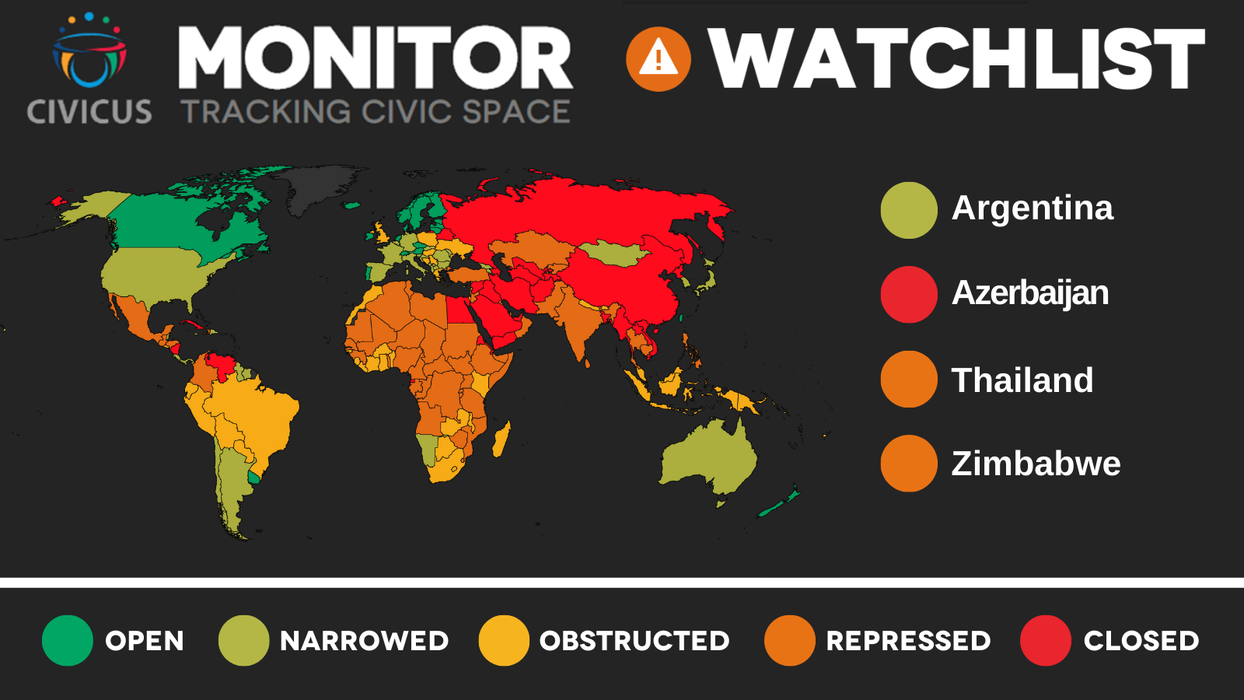Thailand Watchlist September 2024
PRESS RELEASE
Thailand remains on human rights watchlist due to political repression and lèse-majesté prosecutions
23 September 2024
- Thailand’s Constitutional Court dissolves the opposition Move Forward Party
- At least 272 individuals have been prosecuted under lèse-majesté laws since 2020
- Concerns over transnational repression grow as Thailand considers extraditing a refugee and human rights defender to Vietnam
The CIVICUS Monitor has once again placed Thailand on its Watchlist of countries experiencing rapid declines in civic freedoms. This decision follows a series of alarming developments that highlight the ongoing repression of political opposition, activists, and human rights defenders in the country.
On 7th August 2024, Thailand’s Constitutional Court dissolved the opposition Move Forward Party, which had secured the most seats in the last election. The court accused the party of treason for advocating the reform of Penal Code Article 112 on lèse-majesté (royal defamation) and imposed 10-year political bans on all its executive members who served from April 2021 to January 2024. Human rights groups have condemned the decision as politically motivated.
“The dissolution of the Move Forward Party is a blatant attempt to stifle political opposition and silence voices calling for reform,” said Josef Benedict, CIVICUS Monitor Asia researcher . “This politically motivated decision undermines the democratic process and violates fundamental freedoms, especially the right to political participation.”
The government continues to wield the lèse-majesté law as a tool to silence dissent. According to Thai Lawyers for Human Rights (TLHR), at least 272 individuals have been prosecuted under this law since 2020. Recent cases include the sentencing of three activists to seven years in prison for singing a protest song on 18th July, and another conviction of human rights lawyer Arnon Nampa to four years in jail on 25th July for Facebook posts about the monarchy. Pro-democracy activist Parit “Penguin” Chiwarak was also sentenced in absentia to two years in prison on 31st July for similar charges.
In the Deep South, the situation remains dire. Roning Dolah, a prominent Malay Muslim human rights defender, was killed in June 2024. Additionally, nine other activists face potential indictments for sedition and other charges related to their participation in a cultural event in 2022.
“The ongoing use of lèse-majesté laws to target activists and critics is deeply troubling for a country that is seeking a place on the UN Human Rights Council,” said Benedict. “These actions are part of a broader pattern of repression that is eroding civic space and silencing dissent in Thailand. They are also inconsistent with Thailand’s obligations under the International Covenant on Civil and Political Rights”
Transnational repression is another growing concern. Independent UN experts have expressed grave concern over Vietnam’s request to Thailand to extradite refugee and human rights defender Y Quynh Bdap. His extradition hearings are ongoing, and there are fears he could face severe persecution if returned to Vietnam.
Prime Minister Paetongtarn Shinawatra who was elected in August 2024 has not made any commitments to address these concerns. The CIVICUS Monitor urges the Thai government to cease its crackdown on dissent and uphold its international human rights obligations.
Thailand is currently rated ‘Repressed’ by the CIVICUS Monitor. There are a total of 50 countries in the world with this rating (see all). This rating is typically given to countries where civic space is heavily contested by power holders, who impose a combination of legal and practical constraints on the full enjoyment of fundamental rights (see the full description of ratings).
About the CIVICUS Monitor
Over twenty organisations collaborate on the CIVICUS Monitor to provide an evidence base for action to improve civic space on all continents. Civic freedoms in 198 countries and territories are categorised as either ‘closed,’ ‘repressed,’ ‘obstructed,’ ‘narrowed’ or ‘open,’ based on a methodology that combines several data sources on the freedoms of association, peaceful assembly and expression.
Thailand is currently rated ‘Repressed’ by the CIVICUS Monitor. There are a total of 50 countries in the world with this rating (see all). This rating is typically given to countries where civic space is heavily contested by power holders, who impose a combination of legal and practical constraints on the full enjoyment of fundamental rights (see the full description of ratings).
For more information or to arrange an interview, please contact: media@civicus.org
ประเทศไทยยังคงอยู่ในรายชื่อเฝ้าระวังสิทธิมนุษยชนเนื่องจากการปราบปรามทางการเมือง และการดําเนินคดีหมิ่นพระบรมเดชานุภาพ
23 กันยายน 2567
- ศาลรัฐธรรมนูญของไทยยุบพรรคฝ่ายค้าน Move Forward
- มีบุคคลอย่างน้อย 272 คนถูกดําเนินคดีภายใต้กฎหมายหมิ่นพระบรมเดชานุภาพตั้งแต่ปี 2020
- ความกังวลเกี่ยวกับการปราบปรามข้ามชาติเพิ่มขึ้นเมื่อประเทศไทยพิจารณาส่งผู้ลี้ภัยและนักปกป้อง สิทธิมนุษยชนกลับไปยังเวียดนาม
CIVICUS Monitor
ยังคงจัดให้ประเทศไทยอยู่ในรายชื่อเฝ้าระวังของประเทศที่ประสบกับเสรีภาพพลเมืองที่ลดลงอย่างรวดเร็ว การตัดสินใจนี้เกิดขึ้นภายหลังจากการมีเหตุที่น่าวิตกอย่างต่อเนื่องที่เน้นย้ำถึงการปราบปรามฝ่ายค้านทางการเมือง นักเคลื่อนไหว และนักปกป้องสิทธิมนุษยชนในประเทศ
เมื่อวันที่ 7 สิงหาคม พ.ศ. 2567 ศาลรัฐธรรมนูญของไทยได้ยุบพรรคฝ่ายค้าน Move Forward ซึ่งได้ที่นั่งมากที่สุดในการเลือกตั้งครั้งล่าสุด ศาลกล่าวหาว่าพรรคการเมืองนี้ก่อกบฏเพราะสนับสนุนการปฏิรูปประมวลกฎหมายอาญามาตรา 112 เกี่ยวกับการหมิ่นประมาทพระบรมเดชานุภาพ (การหมิ่นประมาทราชวงศ์) และสั่งห้ามสมาชิกผู้บริหารทุกคนที่ดํารงตําแหน่งตั้งแต่เดือนเมษายน 2021 ถึงมกราคม 2024 ไม่ให้มีส่วนร่วมทางการเมืองเป็นเวลา 10 ปี กลุ่มสิทธิมนุษยชนประณามการตัดสินใจดังกล่าวว่ามีแรงจูงใจทางการเมือง
"การยุบพรรค Move Forward เป็นความพยายามอย่างโจ่งแจ้งในการยับยั้งฝ่ายค้านทางการเมืองและปิดปากเสียงที่เรียกร้องให้มีการปฏิรูป" โจเซฟ เบเนดิกต์ นักวิจัยของ CIVICUS Monitor Asia กล่าว "การตัดสินใจที่มีแรงจูงใจทางการเมืองนี้บ่อนทําลายกระบวนการประชาธิปไตยและละเมิดเสรีภาพขั้นพื้นฐาน โดยเฉพาะสิทธิในการมีส่วนร่วมทางการเมือง"
รัฐบาลยังคงใช้กฎหมายหมิ่นพระบรมเดชานุภาพเป็นเครื่องมือในการปิดปากผู้เห็นต่าง จากข้อมูลของทนายความไทยเพื่อสิทธิมนุษยชน (TLHR) มีบุคคลอย่างน้อย 272 คนที่ถูกดําเนินคดีตามกฎหมายนี้ตั้งแต่ปี 2020 คดีล่าสุดได้แก่การตัดสินจําคุกนักเคลื่อนไหวสามคนเป็นเวลาเจ็ดปีในข้อหาร้องเพลงประท้วงเมื่อวันที่ 18 กรกฎาคม ส่วนทนายความด้านสิทธิมนุษยชน อานนท์ นำภาถูกตัดสินจําคุก 4 ปีเมื่อวันที่ 25 กรกฎาคม ฐานโพสต์ข้อความบนเฟซบุ๊กเกี่ยวกับสถาบันกษัตริย์ นักเคลื่อนไหวเพื่อประชาธิปไตย พริษฐ์ “เพนกวิน” ชิวารักษ์ ก็ถูกตัดสินในขณะที่ไม่อยู่ให้จําคุกสองปีเมื่อวันที่ 31 กรกฎาคมด้วยข้อหาที่คล้ายคลึงกัน
ในภาคใต้ตอนล่างสถานการณ์ยังคงน่าเป็นห่วงมาก โรนิ่ง โดลาห์ นักปกป้องสิทธิมนุษยชนชาวมุสลิมมาเลย์ที่มีชื่อเสียง ถูกสังหารในเดือนมิถุนายน พ.ศ. 2567 นอกจากนี้ นักเคลื่อนไหวอีกเก้าคนยังต้องเผชิญกับข้อหายุยงปลุกปั่น และข้อหาอื่นๆ ที่เกี่ยวข้องกับการมีส่วนร่วมในกิจกรรมทางวัฒนธรรมในปี 2022
"การใช้กฎหมายหมิ่นพระบรมเดชานุภาพอย่างต่อเนื่องเพื่อเพ่งเล็งนักเคลื่อนไหวและนักวิจารณ์ เป็นเรื่องที่น่ากังวลอย่างยิ่งสําหรับประเทศที่กําลังแสวงหาที่ในคณะมนตรีสิทธิมนุษยชนแห่งสหประชาชาติ" เบเนดิกต์กล่าว "การกระทําเหล่านี้เป็นส่วนหนึ่งของรูปแบบการปราบปรามในวงกว้างที่กําลังกัดกร่อนพื้นที่พลเมือง และปิดปากผู้เห็นต่างในประเทศไทย นอกจากนี้ยังขัดต่อพันธกรณีของประเทศไทยภายใต้กติการะหว่างประเทศว่าด้วยสิทธิพลเมืองและสิทธิทางการเมือง"
การปราบปรามข้ามชาติเป็นอีกหนึ่งความกังวลที่เพิ่มขึ้น ผู้เชี่ยวชาญอิสระของสหประชาชาติแสดงความกังวลอย่างยิ่งต่อคําขอการส่งตัวกลับจากประเทศเวียดนามต่อไทย เพื่อส่งกลับนาย อี ควิน เบอดั้บ ผู้ลี้ภัยและนักปกป้องสิทธิมนุษยชน การไต่สวนนี้กําลังดําเนินอยู่ และมีความเกรงว่าเขาอาจเผชิญกับการข่มเหงอย่างรุนแรงหากถูกส่งกลับ
นายกรัฐมนตรีแพทองธาร ชินวัตร ซึ่งได้รับเลือกตั้งในเดือนสิงหาคม พ.ศ. 2567 ยังไม่ได้ให้คํามั่นสัญญาใดๆ ที่จะจัดการกับข้อกังวลเหล่านี้ CIVICUS Monitor จึงเรียกร้องให้รัฐบาลไทยยุติการปราบปรามผู้เห็นต่างและรักษาพันธกรณีด้านสิทธิมนุษยชนระหว่างประเทศ
ปัจจุบัน CIVICUS Monitor ได้จัดให้ประเทศไทยอยู่ที่อันดับ 'ถูกกดขี่' ปัจจุบันมีทั้งหมด 50 ประเทศในโลกที่อยู่อันดับนี้ (ดูทั้งหมด) โดยทั่วไปแล้วอันดับนี้จะมอบให้กับประเทศที่พื้นที่พลเมืองถูกโต็แย้งอย่างหนักโดยผู้ถืออํานาจ ที่ใช้ทั้งทางกฎหมายและทางปฏิบัติเพื่อกำหนดข้อจำกัดในการที่ประชาชนจะมีโอกาศได้ใช้สิทธิขั้นพื้นฐานอย่างเต็มที่ (ดูคําอธิบายทั้งหมดของการจัดอันดับ)
